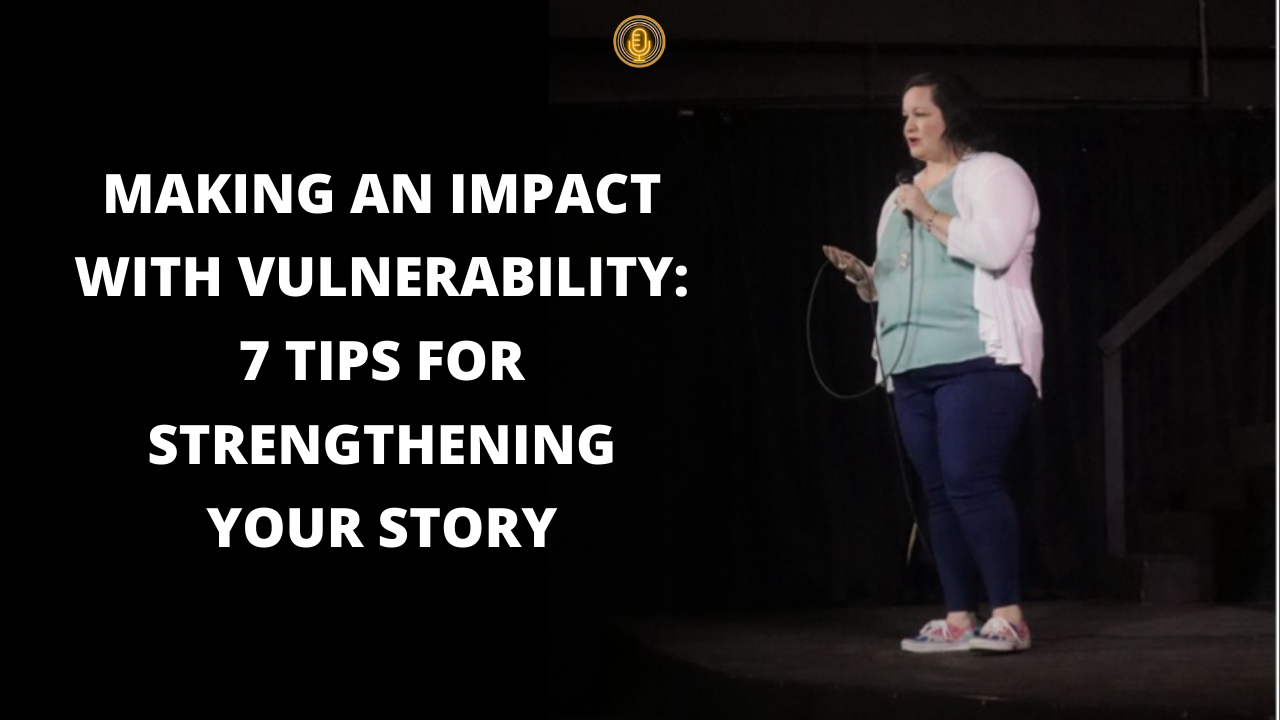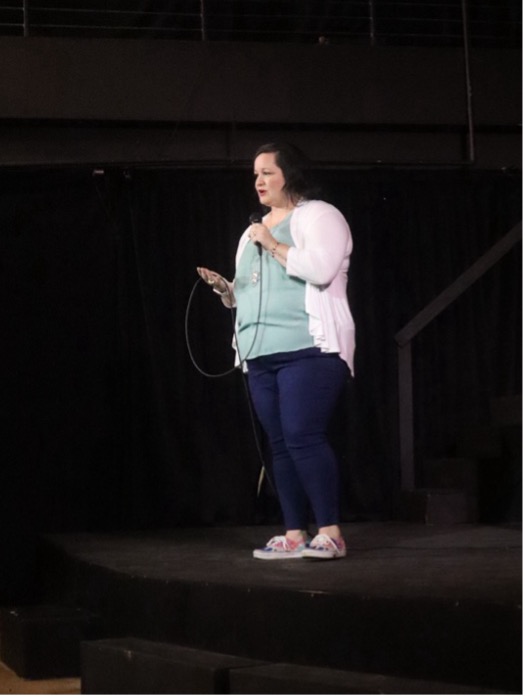Making an Impact with Vulnerability: 7 Tips for Strengthening Your Story

Let’s talk about something that probably makes you squirm a little. Vulnerability.
Just the thought of being vulnerable can bring up some uncomfortable feelings. Sweaty palms. Shaky voice. Racing thoughts. And if you are anything like the people I work with, your first instinct might be to keep it all buttoned up and present yourself as polished, composed, and professional.
But here is the truth no one tells you until you experience it for yourself. Being vulnerable is not weakness. In fact, it is one of the highest forms of courage.
When you share your real story, not just the highlight reel, you are offering your audience something far more powerful than a performance. You are offering them a connection. A mirror. A moment of truth that sticks with them long after your last word.
Speaking vulnerably is not about standing on stage crying through your trauma. It is about being intentional, strategic, and honest. It is about knowing how to use your lived experience to make an impact, not just an impression.
But how do you do that and still provide a valuable speech?
In this article, I will take you through 7 powerful ways to embrace vulnerability in your speaking so that your message lands with depth, truth, and unforgettable connection.
Let’s get into it!
Share with Purpose
Vulnerability is not dumping your emotional baggage on an unsuspecting audience. That is called oversharing, and it does more harm than good. But intentional vulnerability can be a powerful way to draw your audience in. Intentional vulnerability is when you share a piece of your story because it will serve the message you are there to deliver. You are not telling that story to get something off your chest. You are telling it to give your audience something to hold onto and something to relate to.
Ask yourself,
- Why does this story matter to them?
- What insight or shift will this create for the people listening?
- How does this story connect to the lesson I am trying to teach or the message I am trying to convey?
If the answer brings clarity, connection, or emotional resonance, share it. If it is still raw and unresolved, it might be worth holding onto until you have processed it more.
Remember, your audience is not your therapist. But they are your mirror. They will reflect back to you whatever energy you bring to the story, so bring them something true and grounded.
Start Small and Go Deeper with Time
You don’t have to tell your darkest moment the first time you speak, and you probably shouldn’t. You will be nervous the first time you speak so start with something that feels meaningful but manageable. Sharing with vulnerability is not a one-time mic drop. It is a skill that is learned over time with practice and intentional use.
You could start by sharing a story about a time you doubted yourself. Or a decision you regret and what you learned from it. Let the process build. The more you practice, the safer it will feel to go deeper, and the more you will begin to trust your ability to tell the story without losing yourself in it.
This also helps your audience build trust with you. They can feel your authenticity without feeling like they are intruding on something sacred.
Pinpoint the Moment of Truth
Every good story has a pivot point. That moment of truth. The instant everything changed or clicked or fell apart. That is the part your audience will remember. Do not skim past it.
So many speakers rush through the most powerful moment of their story because it feels too vulnerable to sit in it. But I want you to slow it down. Breathe in that moment. Let the audience sit there with you. Make them feel it in their chest, not just hear it in their ears.
Was it a decision you made even though you were afraid?
Was it something someone said to you that changed everything?
Was it the moment you realized something had to change?
That moment matters. That is the heartbeat of your story.
And when you own it fully, you teach your audience how to own their moments too.

Use Emotional Contrast to Build Engagement
Vulnerability does not have to be heavy all the time. In fact, some of the most impactful speeches I have ever seen weave together heartbreak and humor. Tension and release. Struggle and strength.
Emotional contrast is what keeps your audience awake and engaged. Think about a piece of music; it isn’t a single note. It is the combination of many notes, rhythm, dynamics, and contrast that make the music powerful.
Your story should move like that.
If you are telling a tough story, add a light moment for it to breathe. If you are celebrating a win, ground it with a quick reflection on what it took to get there.
Let the audience feel the fullness of your humanity. Because when you do that, you give them permission to be fully human too.
Practice for Connection, Not Perfection
You don’t need to memorize every word, and you don’t need to deliver those words the same way every time you speak them. What you do need is intentional practice so that your words become familiar and easier to say.
Practice telling your story in a way that feels natural and grounded. Record yourself. Say it out loud in the car. Practice in front of someone you trust.
Then ask yourself, “Did I feel connected while telling it?”
That is the real goal. Connection. Not performance, and not perfection.
Practice helps you build familiarity and comfort. And when you are comfortable in your story, your audience will be too.
Create a Safe Container for Your Story
Before you share anything vulnerable, do a gut check.
Have I processed this enough to share it without falling apart? Can I talk about it from a place of reflection, not just reaction?
If the answer is no that is okay. Some stories need more time before they are ready for the stage.
Also, consider your audience. What emotional space are they in? How can you hold the room while holding your truth? You want to create a safe container—for you as the speaker and for them as the listener.
That container is built through intention, pacing, clarity, and care. It is also okay to add a short disclaimer like, “This was a hard lesson for me, but I share it because it helped shape who I am today.”
Let them know it is safe to listen.
Own the Power of What You Have Lived Through
You are not here to prove your worth. You are here to share what you have lived and learned so that others might feel less alone.
You are not less qualified because you don’t have a title or a TED Talk under your belt. You are more than qualified because you survived something, grew through it, and found your voice along the way.
That is your credibility.
Your story might be the thing that helps someone keep going. Or finally say yes. Or finally let go. And you will never know the ripple effect unless you share it.
Let me leave you with this: you do not have to be fully healed to be impactful. You don’t have to wait until every wound is a scar. You do not have to be flawless to be effective. You just have to be honest, present, and brave enough to show up and say, "This is who I am. This is what I have been through. And this is what I learned."
That is what makes a speech unforgettable.
That is what makes a speaker magnetic.
That is what makes you impactful.
Are you ready to craft a story that moves your audience and helps you grow? Let’s do it together.
I help purpose-driven people like you find your voice, build your confidence, and create speeches that leave a lasting impact. Whether you are just starting to speak or ready to take the stage in a bigger way, I can help you bring your story to life.
Book a FREE discovery call with me today to see if working together is right for you!
Because the world does not need another perfectly polished speaker; it needs a real one.
Is it you?
